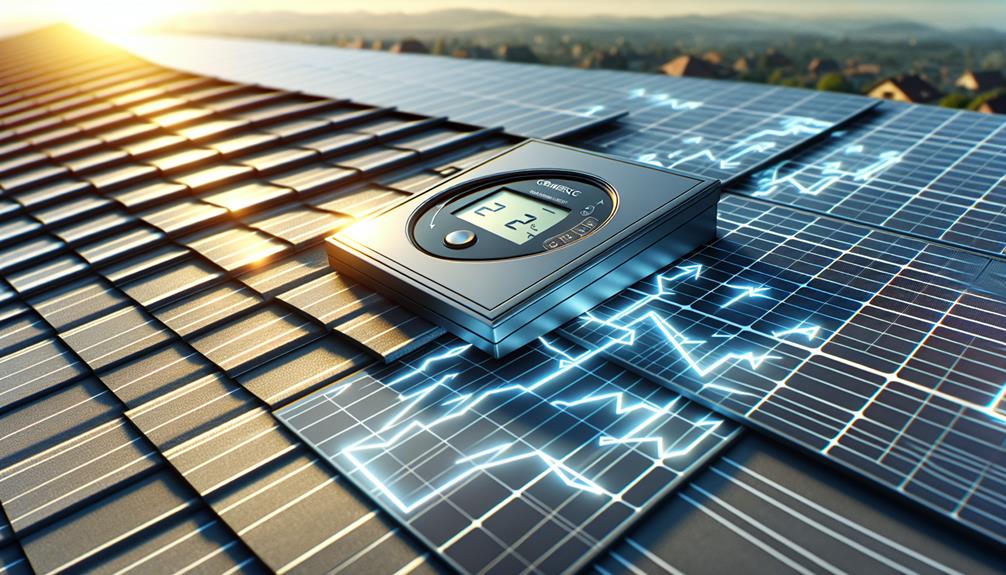So, you're thinking about getting solar panels installed on your home. You've heard all the buzz about how they can save you money, but you're not quite sure if it's too good to be true. Well, let's shed some light on the subject.
Do Solar Panels Actually Save You Money
While the initial cost may seem daunting, solar panels can actually be a smart investment that pays off in the long run. How, you ask? Well, let's just say it involves lower energy bills, increased home value, and a few other surprises along the way.
Do Solar Panels Actually Save You Money
But I won't spill all the beans just yet. Stick around and discover the truth behind whether solar panels can truly save you money.
Do Solar Panels Actually Save You Money
Key Takeaways
Do Solar Panels Actually Save You Money
- Solar panels can significantly lower energy bills by harnessing the power of the sun.
- Excess energy produced by solar panels can be sent back to the grid, earning credits that further reduce energy bills.
- Homes with solar panels sell faster and at higher prices compared to homes without them, increasing property value.
- Tax incentives and rebates, including the federal Investment Tax Credit, can significantly reduce the overall cost of solar panel systems.
Lower Energy Bills
Do Solar Panels Actually Save You Money
Lower your energy bills by installing solar panels on your home. By harnessing the power of the sun, you can significantly reduce your monthly expenses and save money in the long run.
Imagine the sense of belonging that comes with being part of a community of environmentally conscious individuals who are actively taking steps to protect our planet and save money at the same time.
Solar panels work by converting sunlight into electricity, which can be used to power your home. When your solar panels produce more electricity than you need, the excess energy is sent back to the grid, allowing you to earn credits that can further reduce your energy bills. This process, known as net metering, not only saves you money but also contributes to a more sustainable energy future.
In addition to lower energy bills, installing solar panels can increase the value of your home. Studies have shown that homes with solar panels sell faster and at a higher price compared to homes without them. So not only are you saving money on your energy bills, but you're also making a smart investment that will pay off in the long run.
Join the growing community of homeowners who are enjoying the benefits of solar energy. Lower your energy bills, reduce your carbon footprint, and feel a sense of belonging as you contribute to a cleaner and more sustainable future.
Increased Home Value
By installing solar panels on your home, you not only lower your energy bills but also increase the value of your property. Here are three reasons why solar panels can boost your home's value:
- Improved Energy Efficiency: Solar panels reduce your reliance on traditional energy sources, making your home more energy-efficient. Potential buyers are attracted to energy-efficient homes due to the long-term cost savings and environmental benefits. Investing in solar panels demonstrates your commitment to sustainability and can make your property more appealing.
- Potential for Energy Savings: Solar panels generate electricity from the sun, which means you can potentially sell excess energy back to the grid or store it for future use. This added benefit can be a selling point for buyers looking to cut their energy costs and reduce their carbon footprint. The potential for energy savings can make your home more desirable in the real estate market.
- Increasing Demand for Renewable Energy: As the demand for renewable energy continues to rise, properties with solar panels are becoming more sought after. Buyers are increasingly interested in homes that align with their eco-conscious values and offer sustainable energy solutions. Having solar panels installed on your property can set it apart from others and attract buyers looking for environmentally friendly options.
Tax Incentives and Rebates
To further maximize your savings, take advantage of the tax incentives and rebates available for installing solar panels on your home. These incentives and rebates can significantly reduce the overall cost of your solar panel system, making it more affordable and accessible for you.
One of the most significant tax incentives for solar panels is the federal Investment Tax Credit (ITC). This credit allows you to deduct a percentage of the cost of your solar panel system from your federal taxes. Currently, the ITC provides a 26% tax credit for residential solar installations. This means that if your solar panel system costs $20,000, you can deduct $5,200 from your federal taxes.
In addition to the federal ITC, many states and local governments offer their own tax incentives and rebates for installing solar panels. These incentives can vary widely, but they often include additional tax credits, property tax exemptions, or sales tax exemptions.
To find out what tax incentives and rebates are available in your area, it's recommended to consult with a local solar installer or visit the Database of State Incentives for Renewables & Efficiency (DSIRE). This database provides a comprehensive list of available incentives and rebates by state, making it easier for you to determine what savings you may be eligible for.
Reduced Maintenance and Repair Costs
With solar panels, you can enjoy the benefit of reduced maintenance and repair costs. Here are three reasons why:
- Durability: Solar panels are designed to withstand various weather conditions and have a long lifespan. They're built to be durable and require minimal maintenance. Once installed, you won't have to worry about regular repairs or replacements.
- Fewer Moving Parts: Solar panels have a simple design with fewer moving parts compared to other energy systems. This means there are fewer components that can break or malfunction, reducing the need for maintenance and repair. The solid-state technology of solar panels ensures that they're reliable and require minimal attention.
- Warranty Coverage: Most solar panels come with warranties that cover maintenance and repair costs for a specific period. This means that if any issues arise, you can rely on the manufacturer or installer to cover the expenses. Having warranty coverage gives you peace of mind and eliminates the financial burden of unexpected repairs.
Long-Term Savings on Electricity Expenses
As you continue to reap the benefits of reduced maintenance and repair costs with your solar panels, another significant advantage is the long-term savings you'll experience on your electricity expenses. By generating your own clean and renewable energy, you can significantly reduce or even eliminate your monthly electricity bills. This means more money in your pocket, which can be used to enhance your quality of life or save for future endeavors.
With solar panels, you become less reliant on traditional energy sources, which are subject to price fluctuations and increasing rates. Instead, you harness the power of the sun to generate electricity for your home. As a result, you're protected from rising utility costs and have more control over your budget.
Furthermore, by investing in solar panels, you're essentially locking in your energy costs for the long term. Unlike traditional electricity, which is subject to inflation and market volatility, solar energy provides a stable and predictable source of power. This allows you to accurately forecast and plan for your future expenses, providing peace of mind and financial security.
In addition to the immediate savings, solar panels also increase the overall value of your home. Studies have shown that homes equipped with solar panels tend to sell faster and at higher prices than those without. This means that not only are you saving money on your electricity bills, but you're also making a smart investment that adds value to your property.
Frequently Asked Questions
How Long Do Solar Panels Typically Last and What Happens After Their Lifespan?
Solar panels typically last around 25 to 30 years. After their lifespan, you might need to replace them or consider other options. It's important to weigh the costs and benefits to determine the best course of action for your situation.
Are There Any Downsides or Disadvantages to Installing Solar Panels?
Installing solar panels has its downsides and disadvantages. These include the high upfront costs, potential issues with efficiency, and the need for regular maintenance. However, with proper planning, they can still save you money in the long run.
Can I Install Solar Panels on a Property That Is Not My Primary Residence?
Yes, you can install solar panels on a property that is not your primary residence. It's a great way to save money on energy bills and reduce your carbon footprint.
How Do Solar Panels Affect the Environment and Are They Truly Sustainable?
Solar panels have a positive impact on the environment and are considered sustainable. They reduce carbon emissions and reliance on fossil fuels. Plus, they can save you money in the long run through reduced energy bills.
Are There Any Government Regulations or Permits Required for Installing Solar Panels?
Installing solar panels may initially seem complicated, but it's worth it! You'll need to check local regulations and permits, but the benefits of saving money on energy bills and helping the environment make it worthwhile.
Conclusion
So, do solar panels actually save you money? The answer is yes!
By installing solar panels, you can enjoy lower energy bills, increased home value, tax incentives and rebates, and reduced maintenance and repair costs. Not to mention the long-term savings on electricity expenses.
It's a win-win situation.
Coincidentally, by harnessing the power of the sun, you'll not only save money but also contribute to a greener and more sustainable future.

